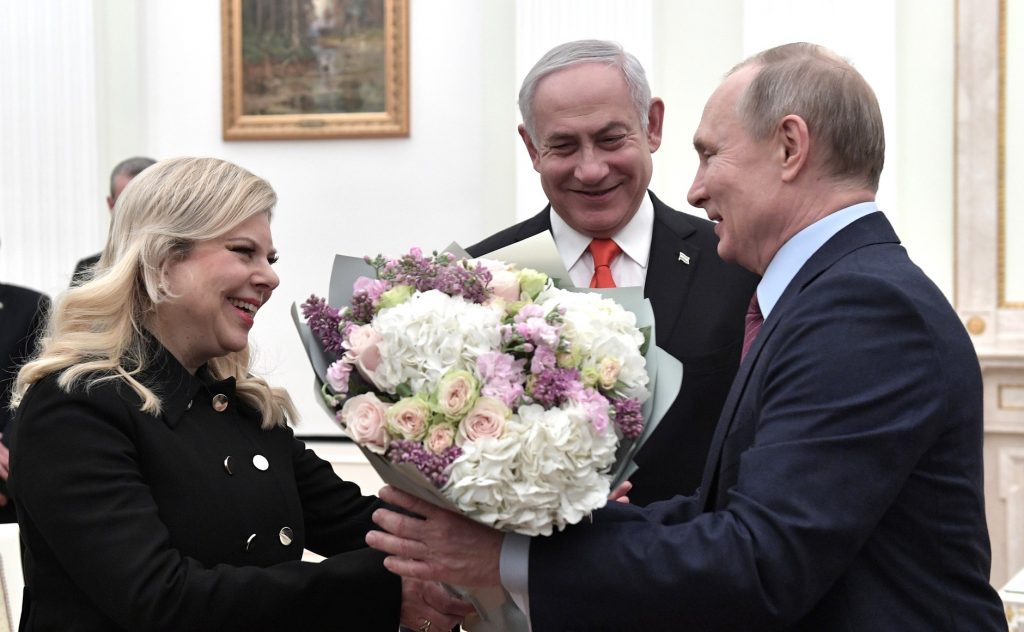Netanyahu’s Trust in Putin: A Grave Geopolitical Miscalculation

Israeli Prime Minister Benjamin Netanyahu’s alliance with Russian President Vladimir Putin was seen as a strategic move to ensure Israel’s security, particularly against threats emanating from Iran and its proxies in the neighboring regions.
Despite the intricate geopolitical dynamics, Netanyahu appeared to have a notable level of trust in Putin, a trust that recent developments suggest might have been gravely miscalculated.
Shifting Alliances and Security Paradigms
Netanyahu believed that Russia had a grasp on Israel’s security concerns, especially concerning its actions in the northern regions like the Golan Heights. He underscored that Putin understood Israel’s stance against Iran and its proxies in Syria, posing significant threats to Israeli territory.
However, the downing of a Russian spy aircraft by Syrian forces (responding to an Israeli strike) over Syrian airspace soured Israeli-Russian relations. Moscow blamed Israel for the incident, providing the advanced S-300 air defense system to Syrian forces, a move seen to limit Israel’s operational freedom in the region.
The Ripple Effect of Geopolitical Miscalculations
The ties between Netanyahu and Putin reflected broader geopolitical dynamics. Netanyahu’s reluctance to arm Ukraine against Russia, for instance, was seen as a reflection of Jerusalem’s ties with Moscow, intertwining security concerns with shared political ideologies. Nonetheless, critics argue that Netanyahu’s policies, including his approach towards Russia, were questioned by former leaders of Israel’s security services, indicating a potential miscalculation in trusting Putin with Israel’s security.
Escalating Tensions: From Hamas Attacks to the Russia-Iran Alliance
Recent geopolitical events have further complicated the already intricate landscape in the Middle East and Eastern Europe. The sudden assault by Hamas on Israel has ignited fears of a broader conflict in the Middle East, while the strengthening ties between Russia and Iran are drawing concerns amid the ongoing conflict in Ukraine.
Hamas’ Surprise Attack
On October 7, 2023, the Palestinian group Hamas orchestrated a surprise attack on Israel, sending shockwaves throughout the region and driving oil prices higher due to fears of a wider conflict in the Middle East. Iran, a known supporter of Hamas, praised the attack, showcasing its support for “anti-Zionist resistance” across the region.
Russia-Iran Nexus: An Emboldened Alliance Amid the Ukrainian Crisis
As the war in Ukraine continues, Russia and Iran are fostering a closer alliance, particularly in military sectors. This collaboration extends to the development and exchange of fighter jets and lethal drones.
The intensified cooperation is seen as a measure to counterbalance Western sanctions and to bolster their military capacities. The burgeoning defense partnership is reportedly transforming their relationship into a full-fledged military alliance, which could significantly boost Iran’s air force capabilities and supply Russia with lethal drones for its war effort in Ukraine.
Hamas-Russia Meetings: A Further Dent in Netanyahu’s Image
In March 2023, Russia extended an official invitation to the Gaza-based Hamas militant group for a meeting in Moscow. These diplomatic engagements signify a strengthening of ties between the Palestinian Islamic resistance movement and Moscow. Additionally, Russian President Vladimir Putin blamed the United States for the escalating conflict between Israel and Hamas, showcasing a stark difference in geopolitical stance as compared to Israel’s perspective on the matter.
These developments, juxtaposed against Netanyahu’s trust in Putin for Israel’s security, may present a scenario where Netanyahu’s faith in Putin appears misplaced or even naive.
The camaraderie between Russia and Hamas, a group with hostile intentions towards Israel, casts a shadow on the Israeli Prime Minister’s assessment of Russia’s role in ensuring Israel’s security, portraying Netanyahu in a less favorable light on the grander scheme of geopolitical affairs.
Now, Netanyahu looks weak, naive, derelict, and incompetent, on top of already being accused of being corrupt. This grave miscalculation has cost dearly, both in terms of human lives and Israel’s geopolitical stance, marking a grim chapter in the annals of Israel’s security and foreign policy.
Bibliography
- The Times of Israel: “Netanyahu: Putin understands Israel’s need to act in north for security“.
- Jerusalem Post: “Netanyahu to Putin: Israel will continue acting against Iran in Syria“.
- Reuters: “Netanyahu says will meet Putin soon on Syria security coordination“.
- The Times of Israel: “Netanyahu meets Putin to share secret intel on Iran threat“.
- Foreign Policy: “Why Israel’s Netanyahu Won’t Arm Ukraine Against Russia“.
- AP News: “Former leaders of Israel’s security services are speaking out against Netanyahu’s policies“.
- The Forward: “What the return of Netanyahu means for the war in Ukraine“.
- Reuters: “Israel on war footing, Hamas threatens to kill captives“.
- Al Jazeera: “What happened in Israel? A breakdown of how Hamas attack unfolded“.
- Politico: “Iran praises Hamas as attack reverberates around Middle East“.
- DW: “US alarmed by growing Iran, Russia ties amid Ukraine assault“.
- Al Arabiya: “Russia’s partnership with Iran strengthened due to war in Ukraine: UK“.
- Haaretz: “Russia Invites Hamas Leaders for Kremlin Visit“.
- PressTV: “Hamas in Russia“.
- Politico: “Putin blames US for Israel-Hamas conflict“.

